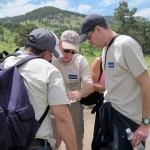
Oh, the dreaded annual review. In our adult lives there are few things as cringe worthy and anxiety inducing. We know that even if we’re doing a good job, we will almost certainly be receiving some form of criticism — and there’s always a lurking fear that somewhere along the way we’ve made some misstep that will come back to haunt us. It feels very much like that one college class you took wherein your entire grade was determined by one single exam. Did you do everything you could to prepare? The what-ifs can stack pretty high prior to entering…
















